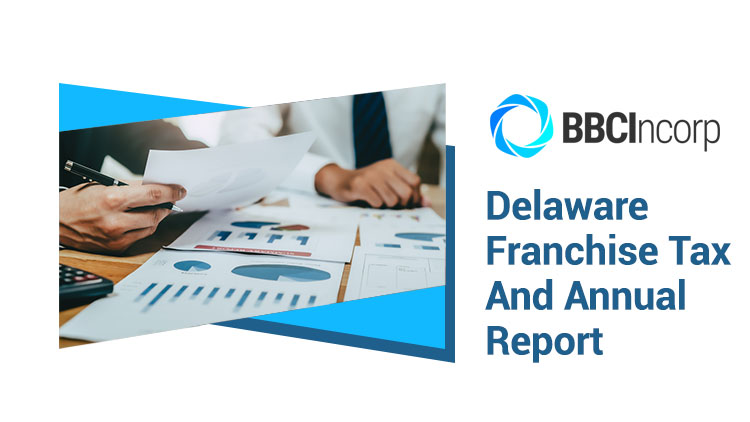
Have you ever received a letter from the State of Delaware asking you to file an annual report with Delaware’s franchise tax payment? Will the notice come even when your company hasn’t generated any revenue yet, or at the start of the new year when your company has been registered at the end of the previous year?
This blog will give you a detailed explanation of the Delaware franchise tax and annual reports.
1. What are Delaware franchise tax and annual tax?
Let’s dive into the concept of Delaware franchise tax and annual tax, so you can get a better understanding of these terms.
1.1 Delaware franchise tax and annual tax
Many business operators in Delaware are confused about the definition of the franchise tax. Some mistake it for the tax imposed on a franchise and believe the tax doesn’t have any relation to their business. Some don’t know how it works, causing them to face difficulties with taxation issues. As a matter of fact, all Delaware corporations are subject to the franchise tax regardless of where they conduct business except for exempt domestic corporations.
The exempt domestic corporations are defined in Delaware Code Title 8. Corporations § 501. Those corporations are discharged from franchise tax, but they still need to file annual reports.
Franchise tax is a crucial factor for the privilege of legally setting up a company and maintaining its good standing status in Delaware. The franchise tax is not dependent on any of Delaware companies’ income but on the types of companies.
All Domestic and Foreign Limited Liability Companies (LLCs), Limited Partnerships (LPs), and General Partnerships (GPs) formed or registered in Delaware are subject to the same annual flat rate of $300.
The tax that a Large Corporate Filer has to pay annually is $250,000. The franchise tax for Delaware corporations, however, is based on the type of business and the number of authorized shares, which is a bit more complicated than other entity types.
Non-stock, non-profit businesses which meet requirements as exempt corporations are not subject to the franchise tax.
Here is the required information for the filing:
- The legal name of the entity
- Total number of authorized shares, class and par value of the shares
- A franchise tax and fees
- Business address and phone number
- Name and address of one officer
- Names and addresses of all directors
Compliance with franchise tax is one of the key requirements for the establishment of your Delaware corporation. Learn more in our article on how to form a Delaware corporation.
1.2 How to calculate franchise tax for your corporation
There are two methods used by the State of Delaware for franchise tax assessment, which are the Authorized Shares Method and the Assumed Par Value Capital Method.
The Authorized Shares Method is the calculation based only on the number of authorized shares. It usually results in higher tax liability for the one using assumed par value stock. The authorized shares method is also the default method used by the State of Delaware. Below is how these two calculating methods are processed:
- Authorized Shares Method
The Authorized Shares method is calculated using the number of shares authorized by the corporations, which is set by the State of Delaware’s following formula:
(1) 5,000 shares or less (minimum tax) $175.00.
(2) 5,001 – 10,000 shares – $250.00,
(3) each additional 10,000 shares or portion thereof add $85.00
(4) maximum annual tax is $200,000.00
This method benefits those corporations owning under 10,000 shares with no par value. For a company with a larger number of shares, this calculation results in a greater amount of tax than the other method.
Example
Let’s take a look at this example to better understand the calculation
With a 1,000,000 authorized share company, the annual franchise tax is computed as below:
- First 10,000 shares are taxed at $250
- For 1,000,000 shares, there are 99 additional sets of 10,000 shares, it is taxed $85 per additional 10,000 shares. This comes to $8,415, plus $250 for the first 10,000 shares.
- The total amount of tax this corporation has to pay is $8,665
In this method, it is important to note that for an additional portion of shares over the first 10,000 shares, even only 1 share, the companies still have to pay $85 of tax for it. The lowest possible amount of tax for this computing is $175.
- Assumed Par Value Capital Method
There are three factors used in this calculation including:
(1) The number of authorized shares
(2) The number of issued shares ( treasury shares included)
(3) The total gross asset. The total gross assets come from Schedule L to federal tax form 1120 relating to the company’s fiscal year ending the calendar year of the report.
The Par Value is listed on Certificates of Incorporation by the companies but is usually set as lowest as possible; thus, Delaware decided to use Assumed Par Value for all corporations, which is calculated as dividing the gross assets by the number of issued shares.
This calculation sets the tax rate at $400 per million or a portion of a million. There are 5 basic steps to calculate the franchise tax based on Par Value Capital Method:
Step 1: Calculate the assumed par value carrying to 6 decimal places.
Step 2: Multiply the assumed par value by the number of authorized shares with a par value lesser than the assumed par value.
Step 3: With all authorized shares having a par value greater than the assumed par value, multiply the number of those shares by the respective par value.
Step 4: Calculate assumed par value capital by adding results from steps 2 and 3 together and round the sum up to the next million dollars.
Step 5: Divide the assumed par value capital by 1,000,000 even when the figure is less than 1,000,000, and multiply by $400. This is your franchise tax.
Example
Here is calculation for a corporation with 1,000,000 authorized shares having par value of $1.00; 300,000 authorized shares having par value of $5.00; $1,000,000 gross assets and 401,000 issued shares:
- Calculating assumed par value by dividing 1,000,000 by 401,000, which is $2.493765
- Assumed par value capital is calculated by adding $2,493,765 and $1,500,000, which is $3,993,765, round up to $4,000,000 (multiply 1,000,000 by $2.493765 is $2,493,765; multiply 300,000 by $5.00 is $1,500,000)
- Dividing $4,000,000 by $1,000,000, then multiply by $400. This comes to $1,600 as the franchise tax.
The tax rate is computed as the function of the total asset so it could be a great advantage to minimize tax for corporations. However, those with few assets should be careful when determining the number of authorized shares and issued shares; or it could lead to a heavy tax burden.
The method can be utilized to maintain the preferred tax rate if the number of issued shares comprises at least a third to half of the shares authorized.
Calculating annual tax using the assumed par value capital method is the most efficient way to lower tax liability for corporations. The minimum taxable amount using this calculation is $400.
The maximum payment for franchise tax using both methods is $200,000 in Delaware.
1.3 When to pay Delaware franchise tax
The due date of franchise tax payments for Delaware corporations for the previous year is on or before the 1st of March. For LPs, LLCs, and GPs, the tax due is on or before the 1st of June.

For a company with over $5000 tax liability, it is compulsory to make quarterly tax payments with different amounts and the due dates for each quarter:
- 40% of the payment due on the 1st of June
- 20% of the payment due by the 1st of September
- 20% of the payment due by the 1st of December
- The remainder is due on the 1st of March
One thing the payer should keep in mind is that the due is based on the calendar year, not the company’s fiscal year. So a company formed at the end of the year still must pay the franchise tax in the early next year even without the revenue generated.
BBCIncorp x TaxHub: Simplify your Delaware company's tax filing with privileges
Tax filing for your Delaware company is never an easy task.
BBCIncorp is collaborating with TaxHub to ensure tax compliance for your Delaware companies, especially if you’re a non-US resident.
By connecting with us, you can receive a 10% discount code and a free 30-minute CPA consultation from TaxHub specialists. Contact us for more information regarding this matter.
It is crucial to follow Delaware corporation franchise tax due date. There is a penalty system created by the State of Delaware for companies missing payment deadlines:
- For domestic corporations, LPs, LLCs, and GPs, missing the deadlines ends in a penalty of $200 plus 1.5% of interest each month on the penalty.
- For foreign corporations, a penalty of $125 will be added to the filing fee.
- Missing the deadline for one-year results in the void declaration for the companies. Aside from any potential legal consequences, the companies will not be able to obtain a Certificate of Good Standing in Delaware.
If you dissolve your Delaware company before the end of the calendar year, you will avoid owing franchise tax to the state for the next year.
1.4. How to pay Delaware franchise tax?
You can pay franchise tax online by following these 4 steps:
Step 1: Go to the State of Delaware – Division of Corporations franchise tax filing page
Step 2: Enter your 7-digit Business Entity File Number; you can look up your number here
Step 3: Provide the required information in the templated webform
Step 4: Pay your tax and filing fee by credit card or electronic debit payment
2. What is the annual report required for Delaware companies?
The annual report is a document including all important information regarding corporate details (such as the board of members, company address, etc.) and business activities of a Delaware company. Depending on each state’s requirements, the needed information for annual report submission can be varied.
Typically, a Delaware annual report shall include:
- The physical address of the Delaware company,
- Name and address of at least one company member,
- Names and addresses of all directors.
All LPs, LLCs and GPs don’t need to file annual reports.
On the contrary, all Delaware domestic and foreign corporations are required to do the filing. Below is the payment for filing the annual report for each group of corporations:
- Exempt corporations: $25
- Non-exempt corporations: $50
- Foreign corporations: $125
The due date for annual report filing is the same as the franchise tax filing which is on or before the 1st of March. Foreign corporations must file annual reports with the Delaware Secretary of State on or before the 30th of June.
The penalty subject to Delaware companies that fail to file the report is the same as the penalty for failing to pay a franchise tax.
Note
For all companies in Delaware, there will be a notice of payment amount and dues sent from The Secretary of The State to the registered agent. Delaware requires all annual reports and franchise tax to be processed and paid online in only US dollars drawn from US banks.
The companies can proceed with filings and payments electronically via the Delaware Division of Corporations or the registered agent’s online system.
3. What are common filing requirements for Delaware companies at the federal level?
Delaware companies are also required to do some other annual filings. Depending on the business entity and the business activity, your business in Delaware may be required to file form 5472 or financial account reports like FATCA or FABAR at the federal level.
- Form 5472
Form 5472 is used to make reportable transactions between the report corporation and foreign or domestic parties transparent to the Internal Revenue Service (IRS). The applicable companies are 25% foreign-owned US corporations including a foreign-owned US disregarded entity, or foreign corporations conducting any business within the US.
Relevant entities must file the form together with the income tax returns by the due date of that tax filing. For the disregarded entities with no income tax filing requirements, the companies must file a pro forma Form 1120 with Form 5472.
- Foreign Bank And Financial Accounts Report (FBAR)
All Delaware companies which have a foreign bank account or other financial accounts with foreign wealth beyond US$ 10000 are required to file Foreign Bank And Financial Accounts Report. The purpose of the filing is to report all money and assets engaged in the accounts to the Internal Revenue Service (IRS) and the Financial Crimes Enforcement Network (FinCEN).
The report must be filed by the due date on the 15th of April or by the automatic extension due on October 15th. A civil monetary penalty or criminal penalty will be applied for companies that fail to file the report.
- Foreign Account Tax Compliance Act (FATCA)
FATCA bears the same reporting nature as FBAR. FATCA is applicable to domestic companies and specified US persons. The Act was established by the government for federal tax administration purposes. It imposes certain regulations on financial or nonfinancial institutions and organizations. Form 8938 is used for the report and must be attached with the annual tax return filing by the due date of such return.
4. Conclusion
Delaware franchise tax, annual reports, and filing requirements are key maintenance tasks for most entities doing business in Delaware. Such issues are considerably complicated and usually cause them trouble. It is highly recommended that you should consult your tax expert before filing.
Disclaimer
While BBCIncorp strives to make the information on this website as timely and accurate as possible, the information itself is for reference purposes only. BBCIncorp would like to inform readers that we make no representation or warranty, express or implied. Feel free to contact BCCIncorp’s customer services for advice on specific cases.
Get helpful tips and info from our newsletter!
Stay in the know and be empowered with our strategic how-tos, resources, and guidelines.


